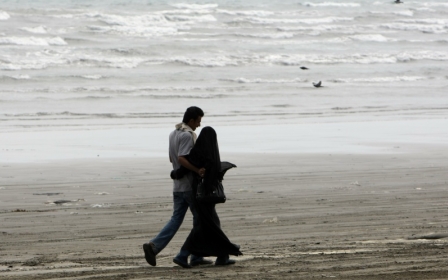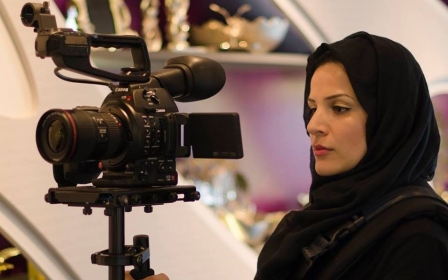
Mocking that 'crazy fatwa' may be exposing your own ignorance about Islam
We all do it from time to time. We hear the word "fatwa" and think, "Here we go again, what are those crazy Muslim clerics up to now?"
You only need to type the word "fatwa" into your search engine to find lists of articles with titles like, "You won’t believe these bizarre fatwas were actually issued" or "And the award for the most ridiculous fatwa goes to…"
Granted, there are some really strange fatwas out there. Some are complete fabrications – like the one claiming a Saudi edict gave men permission to eat their wives in cases of extreme hunger. A little digging shows that those fatwas do not even exist and are complete concoctions intended to "distort the image of Islam," and were never issued to start with.
Others are simple misrepresentations due to mistranslations, but others still are undoubtedly off the wall and seemingly devoid of reason, sense or sound scholarship and are often made by people who have no business issuing fatwas in the first place.
That being said, there are many times when, what may seem at first glance to be one of those weird fatwas that makes for such tempting click bait, there often is actually some sound theological basis behind it.
Fatwas – which are non-binding and non-universal theological advisory opinions on a question of faith - are too often pounced upon for mockery without any real attempt to understand any of the potentially deeper theological reasoning behind them.
Before deriding a religious ruling, in Islam or in any other theological tradition, should we not first attempt to understand why the fatwa was passed in the first place? What is it in response to? What contextual circumstances apply to it? And how legitimate is it when looked at by someone with a sound understanding of Islamic jurisprudence and theology?
To shake or not to shake
Here is one simple example of a fatwa one person might consider unnecessary, but which actually has sound logic behind it in light of current circumstances in Europe.
Generally speaking Islam prohibits physical contact between members of the opposite sex unless they belong to a certain category of relative (e.g. parents and children, husbands and wives etc.) While not all Muslims choose to adhere to this prohibition, there is no doubt that it is nevertheless a well-established principle in Islamic jurisprudence.
However, a fatwa was recently issued stating that men and women could shake hands if it was deemed "necessary". The person mentioning this fatwa to me, laughed that such a fatwa had even been passed, asking when shaking hands would ever be considered "necessary"?
In response, I pointed out that on that very day a ruling had been issued in Switzerland stating that Muslim children in school were no longer permitted to use religious justifications to avoid shaking a teacher’s hand and that any child refusing to shake hands with a member of staff could see their parents/guardians face fines of up to 5000 Swiss francs ($5000).
I pointed out that the aforementioned fatwa could therefore be very useful to a teenage student in Switzerland who wanted to adhere to their religious principles but at the same time did not want to not push their parents into debt, raking up fines every time they declined to shake a teacher’s hand.
A timely fatwa I would say.
It is strange too how others mock the fact that Islam prohibits shaking hands in the first place. Does it not seem hypocritical to those people that if you meet a Muslim man, and his wife declines to shake your hand she is seen as downtrodden, disempowered and belittled, but if you meet a Japanese businessman and his wife, the chances are, knowing and respecting Japanese customs and culture, you would probably not even proffer your hand to his wife in the first place, inclining your head instead in a slight and respectful bow.
Since when does custom trump religion when it comes to respecting a person’s practices?
A cat pic or not a cat pic?
To be fair, on face value, some fatwas do seem to be truly bizarre and if you just take headlines at face value, they can often be extremely misleading; you could be forgiven for thinking: "What the…?"
However, the point I am trying to make is that we should not take those headlines at face value. Dig a little deeper and try to see where these fatwas might possibly be stemming from.
On the same day I had the above conversation about the handshaking, I was told that a fatwa had been passed by a scholar - Sheikh al-Fawzan in Saudia Arabia - forbidding selfies with cats! "Here we go again," I thought. But when I asked a colleague who spoke Arabic to listen to the video of the actual fatwa being passed, his interpretation of the situation was slightly different.
He pointed out that the elderly imam who issued the fatwa appears to be out of touch with modern social media trends, needing the question to be repeated several times. He did not even seem to know what a selfie was at the time he was first asked about it. When he was told it was a photograph you take of yourself holding a cat, the imam responded that photographs were haram (forbidden), so with or without the cat, a selfie was forbidden in his eyes. It was the photograph he was objecting to, not a selfie with a cat per se - but that sure made for a catchier headline.
Whether his opinion is one you agree with or not – and many Muslim scholars do differ on the issue - once again, it seems that sensationalism trumps accuracy in reporting about fatwas.
Many of us may be aware that Native Americans and other aboriginal communities traditionally did not like to be photographed because they believed the camera would capture a part of their soul. While today we may look at that view as naïve and archaic, very few people would openly mock that Native American belief and they would in fact – hopefully – defend someone who believed this and did not want to be photographed. If a Muslim was to express an opinion against photography, however, they are actively derided. Why is this?
Space, the final frontier?
One - quite literally out of this world - fatwa was reported far and wide in the western media a couple of years ago. In 2014, one Telegraph headline screamed: "Muslims ‘warned in fatwa not to live on Mars’."
As bizarre as that headline sounds, it was actually based on an edict issued by the General Authority of Islamic Affairs and Endowment (GAIAE) in the UAE after an estimated 200,000 people, including 500 Saudis and Arabs, had applied to be part of a Dutch Mars One mission to set up a colony on the red planet.
Again, if you look at the reasoning behind the edict, it is not as strange as it sounds at first. The issue that was being considered was risk to life and limb. Anything that is likely to cause unnecessary harm to your body is considered haram in Islam.
Professor Dr Farooq Hamada, who led the committee said: "Protecting life against all possible dangers and keeping it safe is an issue agreed upon by all religions and is clearly stipulated in verse 4/29 of the Holy Quran: 'Do not kill yourselves or one another. Indeed, Allah is to you ever Merciful'."
The issue was therefore whether a one-way trip to Mars was, in essence, a suicide mission, which is forbidden in Islam as it is in many other faiths.
Whether the professor fully understood the risks inherent in the mission is thereafter a matter of debate between the fatwa issuing body and Mars One (who actually did issue an interesting rebuttal urging Muslims to continue with our long tradition of travelling and exploration – in the footsteps of those like Ibn Battuta.
Again a wacky headline, but whether you agree with the fatwa or not, there are clearly theological grounds for a discussion of the issues.
For any would be space explorers, however, it is also worth remembering that the fatwa was an advisory opinion and in no way actually stops people from applying to take part in space travel if that is what they want to do.
How haram could a game of chess possibly be?
One final example of a seemingly obscure fatwa is one that regularly makes headlines, and it relates to chess.
Earlier this year a video clip started circulating on social media in which the grand mufti of Saudi Arabia said chess was haram.
"The game of chess is a waste of time and an opportunity to squander money. It causes enmity and hatred between people," Abdulaziz Bin Abdullah says in the clip.
However, in response, Musa Bin Thaily, president of the law committee at the Saudi Chess Association - yes Saudi has a Chess Association - said he believed that "being an old man in his 80s," Abdullah was unaware that players do not usually bet on the outcome of games.
This goes to the heart of why a negative view of chess was ever held in the first place.
Bearing in mind that many fatwas date back over 1,400 years, this particular ruling was based on an old series of declarations about the game from a time when people did frequently bet on the outcome - gambling is forbidden in Islam - and chess was also frequently associated with drinking and considered to be a waste of time.
However, I would consider this example and the example of an imam being unaware of what a selfie is, to actually say more about the imams who are out of touch with the real world and modern developments than anything inherently prohibitive in Islam.
Criticism is legitimate… when it is legitimate
I am not arguing that criticism of fatwas automatically makes one an Islamophobe, far from it. As Muslims, for instance, it is our duty to seek knowledge, to use our minds and not blindly follow anyone, but instead to constantly question and search for the truth, whatever it may be.
I often find myself questioning fatwas and see nothing wrong with that in and of itself. If I believe a fatwa has a sound basis, I am happy to accept it as legitimate, but I also defend our right to reject that which we do not believe in.
In fact, as a practicing Muslim woman who wears a headscarf (hijab) under my motorcycle helmet which I wear commuting to and from work each day as I speed along on my Honda PCX, you can imagine that I have a few choice words to say about Saudi fatwas that prohibit women from driving in Saudi Arabia.
I am happy to challenge the theological and practical basis on which some Saudi scholars try to stop women from driving and actively support anyone’s right to challenge a fatwa more based on controlling a group of people than on any real religious reasoning.
But we do need to be accurate in the way we discuss religious decrees. By all means question, probe, challenge and even actively oppose religious rulings if you believe they are not made in good faith, or are actively harmful, or are issued by people who have no authority to issue them - but overall, this should be done in a way that is most effective, sensitive and logical.
Remember, these are just advisory opinions
It is important to also remember that fatwas are non-binding. They are issued in response to a specific question, by a specific person, relating to a specific time and place. For instance, a brain surgeon may ask an imam for a fatwa because he has a complex operation to perform, which means he will miss one of his five daily prayers. If he is issued with a fatwa saying he can miss the prayer but must make it up later, this does not apply to everyone and is instead a specific prescription for his particular enquiry.
Fatwa issuing bodies undoubtedly need to be much better regulated, but unless a country chooses to enshrine a fatwa in law - like the Saudi ban on driving for women - then you are free to take or leave a fatwa. You cannot be forced to adhere to someone’s opinion – no matter who they are. You can give someone all the advice they want, but you cannot force them to take it.
So why get so wound up?
- Dr Hanan Chehata is Features Editor at Middle East Eye. She was the Press Officer for the Middle East Monitor for two years and during that time visited many areas in the Middle East including Gaza, the West Bank, Syria, Lebanon, Turkey, Jordan, Sudan and beyond. She has a PhD in Law, a Masters Degree in Criminal Justice and an Honours Degree in Law.
The views expressed in this article belong to the author and do not necessarily reflect the editorial policy of Middle East Eye.
Photo: The ceiling of the Blue Mosque in Istanbul, Turkey (Photo courtesy of Hanan Chehata)
New MEE newsletter: Jerusalem Dispatch
Sign up to get the latest insights and analysis on Israel-Palestine, alongside Turkey Unpacked and other MEE newsletters
Middle East Eye delivers independent and unrivalled coverage and analysis of the Middle East, North Africa and beyond. To learn more about republishing this content and the associated fees, please fill out this form. More about MEE can be found here.




